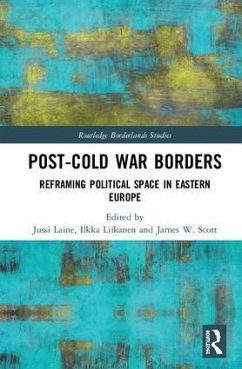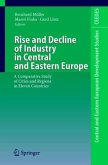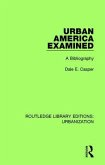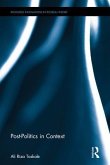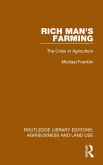Post-Cold War Borders
Reframing Political Space in Eastern Europe
Herausgeber: Laine, Jussi; Scott, James W; Liikanen, Ilkka
Post-Cold War Borders
Reframing Political Space in Eastern Europe
Herausgeber: Laine, Jussi; Scott, James W; Liikanen, Ilkka
- Gebundenes Buch
- Merkliste
- Auf die Merkliste
- Bewerten Bewerten
- Teilen
- Produkt teilen
- Produkterinnerung
- Produkterinnerung
This book explores border conflicts in the EU's eastern neighbourhood via a detailed focus on state power and sovereignty, set in the context of post-Cold war politics and international relations.
Andere Kunden interessierten sich auch für
![Externalizing Migration Management Externalizing Migration Management]() Externalizing Migration Management197,99 €
Externalizing Migration Management197,99 €![Brazilian Agrarian Social Movements Brazilian Agrarian Social Movements]() Brazilian Agrarian Social Movements122,99 €
Brazilian Agrarian Social Movements122,99 €![Rise and Decline of Industry in Central and Eastern Europe Rise and Decline of Industry in Central and Eastern Europe]() Rise and Decline of Industry in Central and Eastern Europe75,99 €
Rise and Decline of Industry in Central and Eastern Europe75,99 €![Urban America Examined Urban America Examined]() Dale CasperUrban America Examined115,99 €
Dale CasperUrban America Examined115,99 €![Post-Politics in Context Post-Politics in Context]() Ali Riza TaskalePost-Politics in Context189,99 €
Ali Riza TaskalePost-Politics in Context189,99 €![Rich Man's Farming Rich Man's Farming]() Michael FranklinRich Man's Farming122,99 €
Michael FranklinRich Man's Farming122,99 €![Adaptation to Climate Change Adaptation to Climate Change]() Mark PellingAdaptation to Climate Change187,99 €
Mark PellingAdaptation to Climate Change187,99 €-
-
-
This book explores border conflicts in the EU's eastern neighbourhood via a detailed focus on state power and sovereignty, set in the context of post-Cold war politics and international relations.
Hinweis: Dieser Artikel kann nur an eine deutsche Lieferadresse ausgeliefert werden.
Hinweis: Dieser Artikel kann nur an eine deutsche Lieferadresse ausgeliefert werden.
Produktdetails
- Produktdetails
- Verlag: Taylor & Francis
- Seitenzahl: 282
- Erscheinungstermin: 26. Juli 2018
- Englisch
- Abmessung: 234mm x 156mm x 18mm
- Gewicht: 576g
- ISBN-13: 9781138590151
- ISBN-10: 1138590150
- Artikelnr.: 53407727
- Herstellerkennzeichnung
- Libri GmbH
- Europaallee 1
- 36244 Bad Hersfeld
- gpsr@libri.de
- Verlag: Taylor & Francis
- Seitenzahl: 282
- Erscheinungstermin: 26. Juli 2018
- Englisch
- Abmessung: 234mm x 156mm x 18mm
- Gewicht: 576g
- ISBN-13: 9781138590151
- ISBN-10: 1138590150
- Artikelnr.: 53407727
- Herstellerkennzeichnung
- Libri GmbH
- Europaallee 1
- 36244 Bad Hersfeld
- gpsr@libri.de
Jussi Laine is an Assistant Professor of Multidisciplinary Border Studies at the Karelian Institute of the University of Eastern Finland Ilkka Liikanen is Professor and director of the VERA Centre for Russian and Border Studies at the Karelian Institute, University of Eastern Finland James W. Scott is Professor of Regional and Border Studies for the Karelian Institute at the University of Eastern Finland
Introduction - Post-Cold War borders and borderscapes Jussi P. Laine, Ilkka
Liikanen and James W. Scott PART ONE: REFRAMING POLITICAL SPACE IN THE EU'S
EASTERN NEIGHBOURHOOD 1. Post-Cold War borders and the constitution of the
international role of the European Union and the Russian Federation Ilkka
Liikanen and Jeremy Smith 2. Decivilised ants and disquiet at European
borders: scaling, geopolitics and everyday bordering Hans-Joachim Bürkner
3. The end of the east-west division - postponed? The rise and fall of the
neighbourhood as an alternative to the Cold War spatial imaginary Ilkka
Liikanen 4. Looking east and west: the shifting concepts of Russia's
borders with CIS countries and the EU Vladimir Kolosov, Olga Vendina, Anton
Gritsenko, Maria Zotova, Fedor Popov and Alexander Sebentsov PART TWO:
REDEFINING POST-COLD WAR BORDERS 5. Media, memory, and diaspora politics in
transnational public spheres Olga Davydova-Minguet 6. 'Familiar others':
Russian-Finnish and Russian-Estonian borderscapes in the Russian media
Olga Brednikova and Elena Nikiforova 7. Changing perceptions of the
Finnish-Russian border in the post-Cold War context Miika Raudaskoski and
Jussi P. Laine 8. Bulgaria's geopolitical identity and the post-Cold War
international order Diana Mishkova and Tonka Kostadinova PART THREE:
CHANGING SPATIAL IMAGINARIES OF BORDERING EUROPE 9. From contact zone to
battlefield area: (un)real borders of (un)declared war in Eastern Ukraine,
2014-2016 Gelinada Grinchenko and Oksana Mikheieva 10. From 'between' to
Europe: remapping Finland in the post-Cold War Europe Miika Raudaskoski
11. The rebirth of the concept of the Carpathian Basin in Hungarian
political language after 1988 Zóltan Hájdu 12. Reconceptualising space,
borders, and identity in Bulgaria: the Kosovo crisis and EU accession
Diana Mishkova and Tonka Kostadinova Conclusions - On borderscapes of
post-Cold War borders Jussi P. Laine and James W. Scott
Liikanen and James W. Scott PART ONE: REFRAMING POLITICAL SPACE IN THE EU'S
EASTERN NEIGHBOURHOOD 1. Post-Cold War borders and the constitution of the
international role of the European Union and the Russian Federation Ilkka
Liikanen and Jeremy Smith 2. Decivilised ants and disquiet at European
borders: scaling, geopolitics and everyday bordering Hans-Joachim Bürkner
3. The end of the east-west division - postponed? The rise and fall of the
neighbourhood as an alternative to the Cold War spatial imaginary Ilkka
Liikanen 4. Looking east and west: the shifting concepts of Russia's
borders with CIS countries and the EU Vladimir Kolosov, Olga Vendina, Anton
Gritsenko, Maria Zotova, Fedor Popov and Alexander Sebentsov PART TWO:
REDEFINING POST-COLD WAR BORDERS 5. Media, memory, and diaspora politics in
transnational public spheres Olga Davydova-Minguet 6. 'Familiar others':
Russian-Finnish and Russian-Estonian borderscapes in the Russian media
Olga Brednikova and Elena Nikiforova 7. Changing perceptions of the
Finnish-Russian border in the post-Cold War context Miika Raudaskoski and
Jussi P. Laine 8. Bulgaria's geopolitical identity and the post-Cold War
international order Diana Mishkova and Tonka Kostadinova PART THREE:
CHANGING SPATIAL IMAGINARIES OF BORDERING EUROPE 9. From contact zone to
battlefield area: (un)real borders of (un)declared war in Eastern Ukraine,
2014-2016 Gelinada Grinchenko and Oksana Mikheieva 10. From 'between' to
Europe: remapping Finland in the post-Cold War Europe Miika Raudaskoski
11. The rebirth of the concept of the Carpathian Basin in Hungarian
political language after 1988 Zóltan Hájdu 12. Reconceptualising space,
borders, and identity in Bulgaria: the Kosovo crisis and EU accession
Diana Mishkova and Tonka Kostadinova Conclusions - On borderscapes of
post-Cold War borders Jussi P. Laine and James W. Scott
Introduction - Post-Cold War borders and borderscapes Jussi P. Laine, Ilkka
Liikanen and James W. Scott PART ONE: REFRAMING POLITICAL SPACE IN THE EU'S
EASTERN NEIGHBOURHOOD 1. Post-Cold War borders and the constitution of the
international role of the European Union and the Russian Federation Ilkka
Liikanen and Jeremy Smith 2. Decivilised ants and disquiet at European
borders: scaling, geopolitics and everyday bordering Hans-Joachim Bürkner
3. The end of the east-west division - postponed? The rise and fall of the
neighbourhood as an alternative to the Cold War spatial imaginary Ilkka
Liikanen 4. Looking east and west: the shifting concepts of Russia's
borders with CIS countries and the EU Vladimir Kolosov, Olga Vendina, Anton
Gritsenko, Maria Zotova, Fedor Popov and Alexander Sebentsov PART TWO:
REDEFINING POST-COLD WAR BORDERS 5. Media, memory, and diaspora politics in
transnational public spheres Olga Davydova-Minguet 6. 'Familiar others':
Russian-Finnish and Russian-Estonian borderscapes in the Russian media
Olga Brednikova and Elena Nikiforova 7. Changing perceptions of the
Finnish-Russian border in the post-Cold War context Miika Raudaskoski and
Jussi P. Laine 8. Bulgaria's geopolitical identity and the post-Cold War
international order Diana Mishkova and Tonka Kostadinova PART THREE:
CHANGING SPATIAL IMAGINARIES OF BORDERING EUROPE 9. From contact zone to
battlefield area: (un)real borders of (un)declared war in Eastern Ukraine,
2014-2016 Gelinada Grinchenko and Oksana Mikheieva 10. From 'between' to
Europe: remapping Finland in the post-Cold War Europe Miika Raudaskoski
11. The rebirth of the concept of the Carpathian Basin in Hungarian
political language after 1988 Zóltan Hájdu 12. Reconceptualising space,
borders, and identity in Bulgaria: the Kosovo crisis and EU accession
Diana Mishkova and Tonka Kostadinova Conclusions - On borderscapes of
post-Cold War borders Jussi P. Laine and James W. Scott
Liikanen and James W. Scott PART ONE: REFRAMING POLITICAL SPACE IN THE EU'S
EASTERN NEIGHBOURHOOD 1. Post-Cold War borders and the constitution of the
international role of the European Union and the Russian Federation Ilkka
Liikanen and Jeremy Smith 2. Decivilised ants and disquiet at European
borders: scaling, geopolitics and everyday bordering Hans-Joachim Bürkner
3. The end of the east-west division - postponed? The rise and fall of the
neighbourhood as an alternative to the Cold War spatial imaginary Ilkka
Liikanen 4. Looking east and west: the shifting concepts of Russia's
borders with CIS countries and the EU Vladimir Kolosov, Olga Vendina, Anton
Gritsenko, Maria Zotova, Fedor Popov and Alexander Sebentsov PART TWO:
REDEFINING POST-COLD WAR BORDERS 5. Media, memory, and diaspora politics in
transnational public spheres Olga Davydova-Minguet 6. 'Familiar others':
Russian-Finnish and Russian-Estonian borderscapes in the Russian media
Olga Brednikova and Elena Nikiforova 7. Changing perceptions of the
Finnish-Russian border in the post-Cold War context Miika Raudaskoski and
Jussi P. Laine 8. Bulgaria's geopolitical identity and the post-Cold War
international order Diana Mishkova and Tonka Kostadinova PART THREE:
CHANGING SPATIAL IMAGINARIES OF BORDERING EUROPE 9. From contact zone to
battlefield area: (un)real borders of (un)declared war in Eastern Ukraine,
2014-2016 Gelinada Grinchenko and Oksana Mikheieva 10. From 'between' to
Europe: remapping Finland in the post-Cold War Europe Miika Raudaskoski
11. The rebirth of the concept of the Carpathian Basin in Hungarian
political language after 1988 Zóltan Hájdu 12. Reconceptualising space,
borders, and identity in Bulgaria: the Kosovo crisis and EU accession
Diana Mishkova and Tonka Kostadinova Conclusions - On borderscapes of
post-Cold War borders Jussi P. Laine and James W. Scott

